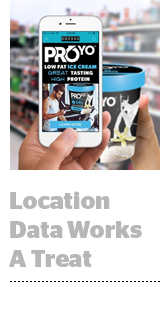
“The frozen dessert area is one of the most cutthroat spots in the whole store,” according to Mike Fransz, ProYo’s VP of marketing.
ProYo, a challenger brand that sells high-protein ice cream, faces three primary marketing challenges: generating awareness in a crowded market, driving foot traffic to the aisle and standing out from a growing pack of specialty ice cream brands.
Location-based targeting ticked all three boxes.
ProYo and its agency of record, Oniracom, partnered with inMarket, a beacon and location data provider, to bolster an omnichannel campaign that aimed to boost product discovery, foot traffic and trial.
“We’re not about tossing up a billboard and hoping people see it,” Fransz said. “We turned to digital as a relationship-building tool. We don’t just want people to find our product, we want them to try it.”
InMarket’s software development kit is integrated into around 700 apps reaching roughly 50 million active mobile devices in the US. The company uses the data from its first-party integrations to identify and target consumers who are likely to be receptive to a message based on their movements in the real world over time.
In ProYo’s case, that meant finding health-conscious people who had expressed an interest in or love of ice cream on social media and who had a propensity for shopping at retailers that also stock ProYo. The campaign was live nationally in more than 1,100 retail locations.
Using inMarket’s knowledge of store visit patterns, ProYo was able to segment potential consumers and hit them with messaging right before they were likely to go on their next shopping trip.
“It was valuable for us to be able to target people by looking at their pre-purchase behavior in popular shopping list apps, recipe sites or when they’re reading about a product like ProYo,” said Oniracom CMO Mike Wald. “That helped tee up ProYo before the store visit.”
With ProYo hopefully on their mind when they enter the store, members of the target audience received push notifications on arrival from one of the shopping apps integrated with inMarket that emphasized the product’s selling points, such as the the fact that it’s high-protein, gluten-free, low in fat and other details likely to appeal in an attempt to drum up sales without necessarily having to offer a discount or a coupon at the outset.
But reaching people in the right frame of mind when they’re in an appropriate location and intend to buy – “all of that requires a variety of integrations and accurate data sources,” said inMarket CMO Cameron Peebles.
“A lot of the timeliness and accuracy issues you see in the space is because the data isn’t always-on or isn’t collected through direct integrations,” Peebles said. “The quality of the data has to be first-party-validated by multiple data points.
“That way you’re not just saying, ‘Someone is likely here.’ Rather, you know who a person is and what they’re doing in that moment, so you can communicate with them in a creative way that drives action.”
The ProYo campaign tapped a combination of location-based data points through inMarket to verify store visits, including beacon data, GPS and Wi-Fi signals and data gathered through inMarket’s SDK footprint.
Brand awareness of ProYo increased by more than 21% and purchase intent among target shoppers more than doubled. The clickthrough rate on ProYo’s pre-shopping messaging was 4.47%, well above industry benchmarks.
“You can have the greatest data out there, but if it’s not actionable, then you’re wasting or missing an opportunity with your consumer,” Fransz said. “But by understanding the data, the timing and consumer shopping trends and habits, our ad space became that much more valuable and that much more likely to have an impact.”
This post was syndicated from Ad Exchanger.

More Stories
Gray Promotes Dana Neves to Senior Managing VP
WPP’s Q1 Revenues Slide 5%, but Tariffs Aren’t to Blame
Revolving Door Roundup: Gary Tuchman Departs CNN After 35 Years